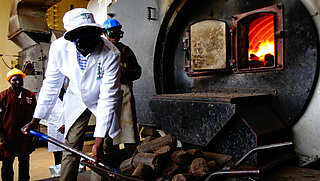Kenya: Sugar cane as a green fuel

The vibrant, green fields of Kenya's tea plantations provide jobs and income to millions of people in the country. Kenya is a key producer of the crop in Africa, and efforts are now being made to make the industry more environmentally friendly.
Firewood has often been used to power the production process. To reduce deforestation, the country is looking for sustainable alternatives. Over 600,000 small tea farmers work within the The Kenya Tea Development Agency. Some of these producers are exploring the use of bio-energy briquettes made from waste from sugarcane processing.
Sugarcane is grown in large quantities in Kenya, and the remnants are often left to rot, releasing carbon dioxide into the air. The briquettes are easy to transport and produce more energy per unit than wood. Transforming the raw waste material into bioenergy could not only reduce the industry's environmental impact but also bring economic benefits.
A film by Cornelia Borrmann
The link has been copied to the clipboard
Information
Language
English
Length
7:02
Date of publication
2020
Country
Kenya
Project
Global Ideas

Related Publications
Further publications related to the International Climate Initiative and its projects can be found in the publications section of our website.



